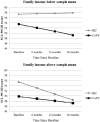Long-Term Caregiver Mental Health Outcomes Following a Predominately Online Intervention for Adolescents With Complicated Mild to Severe Traumatic Brain Injury
- PMID: 25682211
- PMCID: PMC4505072
- DOI: 10.1093/jpepsy/jsv001
Long-Term Caregiver Mental Health Outcomes Following a Predominately Online Intervention for Adolescents With Complicated Mild to Severe Traumatic Brain Injury
Abstract
Objective: To examine the efficacy of counselor-assisted problem solving (CAPS) in improving long-term caregiver psychological functioning following traumatic brain injury (TBI) in adolescents.
Methods: This randomized clinical trial compared CAPS (n = 65), a predominantly online problem-solving intervention, with an Internet resource comparison (n = 67) program. Families of adolescents with TBI completed a baseline assessment and follow-up assessments 6, 12, and 18 months later. General linear mixed models were used to examine longitudinal changes in caregiver global psychological distress, depressive symptoms, and caregiving self-efficacy. Family income and injury severity were examined as moderators of treatment efficacy.
Results: Family income moderated long-term changes in caregiver psychological distress. For lower-income caregivers, the CAPS intervention was associated with lower levels of psychological distress at 6, 12, and 18 months post baseline.
Conclusions: These findings support the utility of Web-based interventions in improving long-term caregiver psychological distress, particularly for lower-income families.
Keywords: caregiver outcomes; psychopathology; traumatic brain injury.
© The Author 2015. Published by Oxford University Press on behalf of the Society of Pediatric Psychology. All rights reserved. For permissions, please e-mail: journals.permissions@oup.com.
Figures


References
-
- Aitken M. E., McCarthy M. L., Slomine B. S., Ding R., Durbin D. R., Jaffe K. M., Paidas C. N., Dorsch A. M., Christensen J. R., Mackenzie E. J.; CHAT Study Group. (2009). Family burden after traumatic brain injury in children. Pediatrics, 123, 199–206. - PubMed
-
- Anderson V. A., Catroppa C., Haritou F., Morse S., Pentland L., Rosenfeld J., Stargatt R. (2001). Predictors of acute child and family outcome following traumatic brain injury in children. Pediatric Neurosurgery , 34, 138–148. - PubMed
-
- Bothroyd R. A. (1997). Preliminary manual for the caregiver self-efficacy scale. Tampa, FL: Louis de la Parte Florida Mental Health Institute.
Publication types
MeSH terms
Grants and funding
LinkOut - more resources
Full Text Sources
Other Literature Sources
Medical
Miscellaneous

